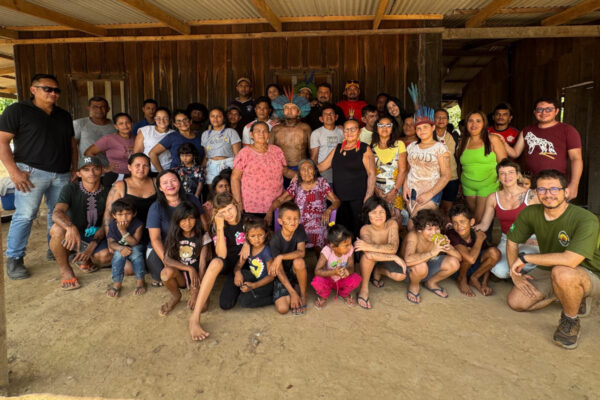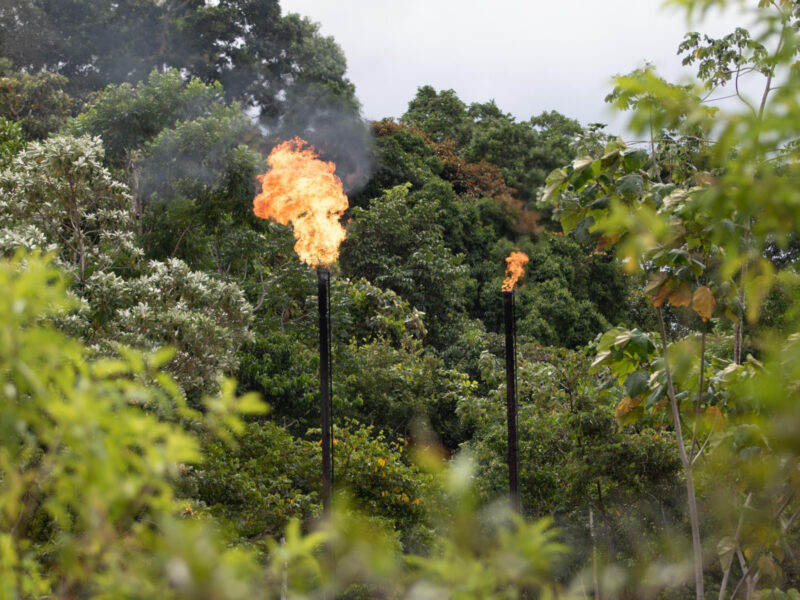New York, NY – Investor nuns and Baptists are demanding that Citi and Wells Fargo end funding linked to Indigenous Peoples’ Rights violations after shareholders voted on two related proposals at their annual general meetings today. A proposal filed at Citi for a fourth year by the Sisters of St Joseph of Peace reached 13% support, while a proposal filed by the American Baptist Home Mission Societies at Wells Fargo also did not pass. This signals that the fear induced by the Trump regime is seeping into investor sentiment as corporations and ultra-wealthy turn their backs on human rights and climate.
“Despite today’s shameful result from shareholders, advocates for justice and sustainability stand firm in our commitment to hold banks accountable for their role in perpetuating human rights abuses and environmental degradation,” said Roishetta Ozane, co-founder and co-director of the Gulf South Fossil Finance Hub. “It is imperative that institutions like Citi and Wells Fargo recognize their responsibility to the communities they impact and take meaningful steps towards divesting from fossil fuels.”
The banks faced tough questions about their controversial Indigenous Peoples’ Rights records, climate policies, fossil fuel financing, and financing environmental racism in the U.S. Gulf South:
- Wells Fargo claimed to “serve Indigenous communities”—an inadequate and troubling response that fails to address the core human rights concerns tied to its financing. On questions about the bank’s dangerous decision to drop its financed emissions targets, the CEO emphasized its commitment to its fossil fuel clients.
- Citi reiterated its commitment to “energy security,” pointing to its ineffective report on “Respecting Indigenous Peoples,” denying its role in financing LNG projects in the Gulf South, and ignoring a question about the release of its energy finance ratio, as agreed last year. Citi also dodged a question about its client, Petroperú, which seeks to produce oil in highly contested blocks in the Amazon basin despite Indigenous opposition.
Both investor groups prevailed despite attempts by the major Wall Street banks to silence their proposals, after the SEC ruled in March that they should go to shareholders for a vote.
Citi and Wells Fargo are under fire over their funding for Enbridge, the fossil fuel company behind controversial pipelines such as the Dakota Access Pipeline, Lines 3 and Line 5 and the Rio Bravo pipeline in south Texas. Citi is also criticized as one of the biggest funders of oil and gas in the Amazon rainforest, where it funds Petroperú, PetroAmazonas and Frontera Energy, companies linked to oil spills and Indigenous Peoples’ rights violations, including Petroperú’s disastrous spill of at least 6,000 liters of oil, leading to a humanitarian crisis that severely impacted the lives of Indigenous peoples.
The Citi resolution, presented by Olivia Bisa Tirko – the first woman President of the Autonomous Territorial Government of the Chapra Nation in the Peruvian Amazon – noted the serious and life-threatening implications associated with Citi continuing to back oil companies that disregard Indigenous Peoples’ rights and are responsible for the destruction of their territories.
The Wells Fargo resolution was presented by Caitlin Seznec, program director at Investor Advocates for Social Justice. She emphasized that Indigenous Peoples have the right to determine whether a project proceeds on their land – a right that is violated when Wells Fargo continues to finance companies like Enbridge, which operate without local Indigenous communities’ free, prior, and informed consent.
In New York, activists with Planet Over Profit shut down the Wells Fargo headquarters, blocking employees from entering while holding banners saying “Oil Wells Fargo Funds Death” and “End Financial Colonialism.” Private security responded with disproportionate force, shoving and taunting peaceful protestors. Four protestors were arrested amid chants of “We’ll be back.”
Quotes
Sister Susan Francois:
“Pope Francis called us to stand in solidarity with Indigenous Peoples impacted by destructive and extraction industries on their lands. We are grateful to Olivia Bisa from the Chapra Nation for presenting our proposal today at the AGM. We believe it is good business as well as a moral imperative to respect the human rights of Indigenous People impacted by climate projects. As shareholders we will continue to keep this issue front and center because the risk to the company and the communities is too big to ignore.”
Olivia Bisa, President of the Autonomous Territorial Government of the Chapra Nation:
“Major investors and financiers, such as Citigroup, have created an overwhelming oil debt in our country, Peru. Now, the pressure to repay this debt is pushing our government to open new oil blocks in our Amazonian territories and offshore waters – generating conflict among those of us who legitimately oppose these oil activities. Oil is poison to us. Oil destroys everything in its path, biodiversity, human life, and worsens global warming and climate change. Financing oil companies, oil extraction in the Amazon, is financing death and destruction – our own self-destruction.”
Hannah Saggau, Senior Climate Finance Campaigner at Stand.earth:
“So much for banks ‘respecting’ Indigenous communities. Today’s annual meetings are a disgrace for Citi and Wells Fargo’s shareholders. It’s clear that investors are caving to the fear induced by the Trump regime, and no longer have the spines to hold banks accountable for violating Indigenous Peoples’ rights and polluting frontline communities of color.”
Mary Mijares, Corporate Campaigns Manager, Amazon Watch:
“To truly respect Indigenous rights, Citi must directly and meaningfully address the concerns of Indigenous Peoples who repeatedly endure and persist against its oil clients that promote life-threatening fossil fuel activities impacting the Amazon basin and Indigenous lands everywhere. Today’s disappointing vote shows that investors must do more to scrutinize Citi’s bold claim that it has sufficiently addressed Indigenous rights concerns, especially upon hearing that the situation for oil-impacted Indigenous communities on the ground remains dire.”
Caitlin Seznec, Program Director, Investor Advocates for Social Justice:
“Financial institutions have a responsibility to uphold human rights, and the continued failure by major banks to take accountability is profoundly troubling. Today’s disappointing result underscores the urgent need to keep spotlighting these issues – there is clearly more work to be done to ensure Indigenous Peoples’ rights are respected and protected, and for the banks to recognize the serious material risks associated with these ongoing harms.”













